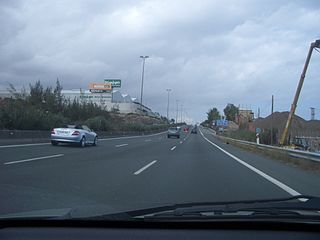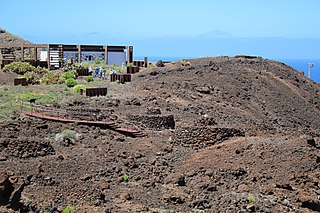See also
| Sovereign states |
|
|---|---|
States with limited recognition | |
Dependencies and other territories |
|
This is a list of all the municipalities in the autonomous community of the Canary Islands, Spain.
The rest of the islets are uninhabited, except La Graciosa, which contains a hamlet, Caleta de Sebo.

The Canary Islands, also known informally as the Canaries, are a Spanish region, autonomous community and archipelago in the Atlantic Ocean. At their closest point to the African mainland, they are 100 kilometres west of Morocco. They are the southernmost of the autonomous communities of Spain. The islands have a population of 2.2 million people and are the most populous special territory of the European Union.

Las Palmas, officially Las Palmas de Gran Canaria, is a Spanish city and capital of Gran Canaria, in the Canary Islands, in the Atlantic Ocean.

Gran Canaria, also Grand Canary Island, is the third-largest and second-most-populous island of the Canary Islands, an archipelago off the Atlantic coast of Northwest Africa and is part of Spain. As of 2023 the island had a population of 862,893 that constitutes approximately 40% of the population of the archipelago. Las Palmas de Gran Canaria, the capital of the island, is the biggest city of the Canary Islands and the ninth of Spain.

Tenerife is the largest and most populous island of the Canary Islands. It is home to 42.9% of the total population of the archipelago. With a land area of 2,034.38 square kilometres (785.48 sq mi) and a population of 948,815 inhabitants as of January 2023, it is also the most populous island of Spain and of Macaronesia.

Santa Lucía de Tirajana is a town and a Spanish municipality in the south-eastern part of the island of Gran Canaria, in the Province of Las Palmas, in the Canary Islands.

San Bartolomé de Tirajana is a village and a Spanish municipality in the south-eastern part of the island of Gran Canaria in the Las Palmas province in the Canary Islands. With an area of 333.13 km2 (128.62 sq mi), San Bartolomé de Tirajana is the largest municipality in area on the island as well as the Canary Islands. The population is 56,698 (2013).

La Matanza de Acentejo is a town near the north coast of Tenerife, Canary Islands, Spain. It is located 10 km east of Puerto de la Cruz, and about 20 km west of the island's capital, Santa Cruz de Tenerife. Its name means "the Slaughter of Acentejo" in Spanish, and refers to the 1494 First Battle of Acentejo, lost by the Spanish.

Breña Baja is a municipality on the eastern side of the island of La Palma, in the province of Santa Cruz de Tenerife, in the Canary Islands. The ayuntamiento is in the town of San José with an elevation of 300 m. Until the 17th century the area was known as Breña, but was then divided into Breña Alta and Breña Baja.

Breña Alta is a municipality on the eastern side of the island of La Palma, in the province of Santa Cruz de Tenerife, in the Canary Islands. The ayuntamiento is in the town of San Pedro, at 350 m above sea-level, and only 9 km south of the island's capital Santa Cruz de la Palma. Breña Alta lies on the main highway encircling the island, just north of La Palma Airport. Until the 17th century the area was known as Breña, but was then divided into Breña Alta and Breña Baja.

The GC-1 is a superhighway on the island of Gran Canaria. It links the capital Las Palmas in the north with Puerto de Mogán in the south. It is the fastest route from the north of the island to the south and vice versa with a top speed limit of 120 km/h (75 mph). It is approximately 75 km in length, and runs along the eastern and the southern coasts of this circular island and is also the second longest superhighway in the Canary Islands. The road provides easy access from the airport to the major cities and resorts. The resorts include Maspalomas and Playa del Inglés. The increase in tourism over the years has seen the GC1 route slowly being upgraded and widened to cope with extra traffic.

The TF-1 is a motorway encircling the eastern and the southern parts of the island of Tenerife. The TF-1 motorway runs from the capital Santa Cruz in the north to Adeje with its major tourist resorts Los Cristianos and Playa de las Américas in the south of the island, and continues to Santiago del Teide in the west. It is a 103 km motorway and interchange numbers go facing south. The motorway is one in the Canary Islands that passes through most of the municipalities and is the longest in the archipelago.

The Maspalomas Lighthouse is an active 19th century lighthouse at the southern end of the Spanish island of Gran Canaria, in the Canary archipelago. It lies at one end of the Maspalomas beach, 4 kilometres (2.5 mi) south of the resort town centre, next to the area known as the Maspalomas Dunes.

The Hospital Universitario Insular de Gran Canaria is a teaching hospital of general scope in Gran Canaria. Located in the city of Las Palmas de Gran Canaria, it was founded 13 February 1971 and consists in February 2021 of 503 beds. The first patient was hospitalized 20 September 1971.

The El Maipés necropolis is an ancient burial site near Agaete on the Spanish island of Grand Canary, province of Las Palmas in the Canary Islands of the west coast of Africa.
The following is a timeline of the history of the city of Las Palmas, Canary Islands, Spain.

Vecindario is a town in the municipality of Santa Lucía de Tirajana in the south-eastern part of the island of Gran Canaria, in the Province of Las Palmas, in the Canary Islands. The population of Vecindario was estimated at 14910 inhabitants in the 2015 census. Its current mayor is Dunia Gonzalez.
As in the rest of Spain, the majority religion in the Canary Islands is the Catholic Church. The Catholic religion has been the majority since the Conquest of the Canary Islands in the fifteenth century. This religion would largely replace the Canarian aboriginal religion through the prohibition of the latter and syncretism. According to a survey conducted in 2019, Canary Islands is the fifth autonomous community in Spain with the highest percentage of people who declare themselves to be Catholics after the Region of Murcia, Extremadura, Galicia, Aragon, and Castile and León. 76.7% of the population is Catholic.

Tren de Gran Canaria is a proposed railway on the island of Gran Canaria in the Canary Islands. It is planned to run from the island's capital, Las Palmas along the eastern coast of the island, serving Gran Canaria Airport and terminating in Maspalomas. First announced in 2004, construction on the line has not yet commenced due to funding difficulties.
In the run up to the 2023 Spanish local elections, various organisations carry out opinion polling to gauge voting intention in local entities in Spain. Results of such polls for municipalities and island cabildos in the Canary Islands are displayed in this article. The date range for these opinion polls is from the previous local elections, held on 26 May 2019, to the day the next elections will be held, on 28 May 2023.